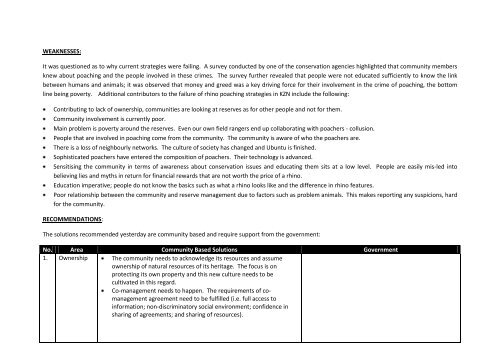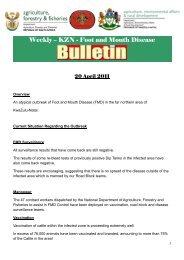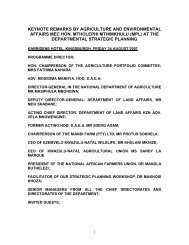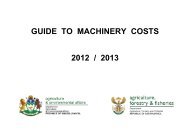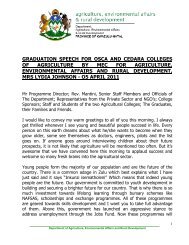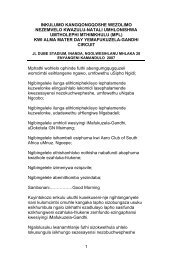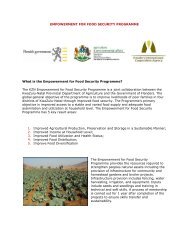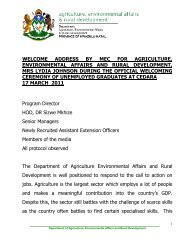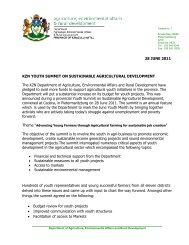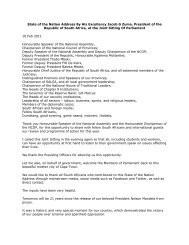rhino summit key actions emanating from discussions on 22 may 2013
rhino summit key actions emanating from discussions on 22 may 2013
rhino summit key actions emanating from discussions on 22 may 2013
You also want an ePaper? Increase the reach of your titles
YUMPU automatically turns print PDFs into web optimized ePapers that Google loves.
WEAKNESSES:<br />
It was questi<strong>on</strong>ed as to why current strategies were failing. A survey c<strong>on</strong>ducted by <strong>on</strong>e of the c<strong>on</strong>servati<strong>on</strong> agencies highlighted that community members<br />
knew about poaching and the people involved in these crimes. The survey further revealed that people were not educated sufficiently to know the link<br />
between humans and animals; it was observed that m<strong>on</strong>ey and greed was a <str<strong>on</strong>g>key</str<strong>on</strong>g> driving force for their involvement in the crime of poaching, the bottom<br />
line being poverty. Additi<strong>on</strong>al c<strong>on</strong>tributors to the failure of <str<strong>on</strong>g>rhino</str<strong>on</strong>g> poaching strategies in KZN include the following:<br />
C<strong>on</strong>tributing to lack of ownership, communities are looking at reserves as for other people and not for them.<br />
Community involvement is currently poor.<br />
Main problem is poverty around the reserves. Even our own field rangers end up collaborating with poachers - collusi<strong>on</strong>.<br />
People that are involved in poaching come <str<strong>on</strong>g>from</str<strong>on</strong>g> the community. The community is aware of who the poachers are.<br />
There is a loss of neighbourly networks. The culture of society has changed and Ubuntu is finished.<br />
Sophisticated poachers have entered the compositi<strong>on</strong> of poachers. Their technology is advanced.<br />
Sensitising the community in terms of awareness about c<strong>on</strong>servati<strong>on</strong> issues and educating them sits at a low level. People are easily mis-led into<br />
believing lies and myths in return for financial rewards that are not worth the price of a <str<strong>on</strong>g>rhino</str<strong>on</strong>g>.<br />
Educati<strong>on</strong> imperative; people do not know the basics such as what a <str<strong>on</strong>g>rhino</str<strong>on</strong>g> looks like and the difference in <str<strong>on</strong>g>rhino</str<strong>on</strong>g> features.<br />
Poor relati<strong>on</strong>ship between the community and reserve management due to factors such as problem animals. This makes reporting any suspici<strong>on</strong>s, hard<br />
for the community.<br />
RECOMMENDATIONS:<br />
The soluti<strong>on</strong>s recommended yesterday are community based and require support <str<strong>on</strong>g>from</str<strong>on</strong>g> the government:<br />
No. Area Community Based Soluti<strong>on</strong>s Government<br />
1. Ownership The community needs to acknowledge its resources and assume<br />
ownership of natural resources of its heritage. The focus is <strong>on</strong><br />
protecting its own property and this new culture needs to be<br />
cultivated in this regard.<br />
Co-management needs to happen. The requirements of comanagement<br />
agreement need to be fulfilled (i.e. full access to<br />
informati<strong>on</strong>; n<strong>on</strong>-discriminatory social envir<strong>on</strong>ment; c<strong>on</strong>fidence in<br />
sharing of agreements; and sharing of resources).


